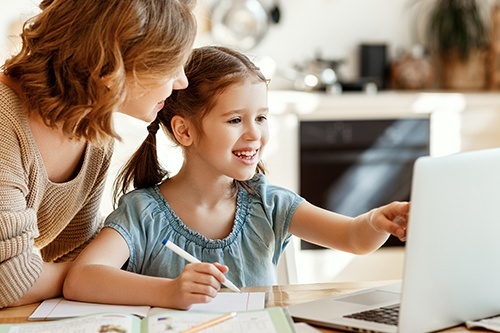
by North Shore Child & Family Guidance Center | Aug 20, 2020 | Blog
As fall approaches, the return to school is weighing heavily on students and their parents alike. With the ongoing COVID-19 pandemic, most schools have adopted at least a partially remote learning model for the fall semester. Families were first rushed into remote learning in March 2020 as schools quickly shut down, and many are looking to find ways to improve the experience of remote learning for the fall.
For younger students especially, remote learning can pose many challenges. Young children often struggle to remain focused on their work, and the home environment and its many distractions can heighten this difficulty.
Parents should attempt to mitigate the distractions for their children while they are doing schoolwork. Try to find a small, quiet area of the home for them to attend virtual classes and complete homework. Personalize the space (and enjoy some creative crafts!) with poster boards and decorate with name tags, stickers and school supplies for the area.
While it can be hard for parents to manage their children’s classwork alongside their own work and other responsibilities, it is important to help younger children stay on task. Familiarize yourself with the schedule your school has set up for your children to ensure they attend online classes and do not miss assignments.
For older children in elementary and middle school, parents can see this as a chance to foster their children’s independence. While, again, it is useful to be familiar with your children’s schedules, encourage them to keep track of their work themselves. Simple planners, dry-erase calendars and creative task lists can be helpful.
This age group will also likely struggle with managing distractions. Encourage your children to include fun activities in their schedules. Once their school day comes to an end and their homework is complete, use these activities, such as video games or outdoor play, as a reward for finishing their tasks.
It is also important for these children to keep in touch with their peers safely. Explore virtual options to connect with friends, including Netflix party and Jackbox Games. Weather permitting, take advantage of the outdoors to spend time with friends safely and enjoy the fresh air.
High school students will need their own space to do their work. Ensure that they have a quiet environment to attend their remote classes and work on their assignments. These students will need to stay on top of their responsibilities. With remote learning, this can be a challenging task for the most organized of students. Encourage them to maintain planners and take advantage of online resources. Google Suite offers many different services that can aid students of all ages, including Google calendar, drive and classroom. Applications for both smartphones and computers can also help to stay on track, including the Reminder app from Apple (already pre-installed on all their devices!) and Todoist.
College students are in a particularly difficult state of flux. With many schools opting for either hybrid or entirely online plans, many students are unsure of where they should choose to stay. If you are on-campus, explore the options that are safely open. Libraries and study spaces at many universities have been redesigned to ensure social distancing and adherence to safety protocols in order to remain available to students.
Whether at home or in a dorm, be sure to establish a dedicated space for studying and attending classes. Just like all the other age groups, minimizing distractions is a must. When attending an online lecture, consider putting your phone in another room and set all notifications on your computer to “do not disturb” for the class time.
Make a master list of synchronous class times, in-person class events (if you have them), asynchronous assignments and due dates, as well as the dates of any exams you have and the way in which they will be administered. Reflect on the end of last semester and the beginning of online courses. What worked for you? What did not?
Reach out to your peers, advisors and professors for advice if you find yourself accidentally falling behind. Many professors are empathetic given the turbulent situation, so try not to get too down on yourself if you slip up. You are only human, and your professors know this too. These are trying times for everyone, so remember to be kind to yourself. Just as younger kids will need dedicated time for non-school-related activities they enjoy, incorporate alone and self-care time into your schedule.
While this semester will be challenging and unpredictable, parents and students alike should attempt to stay focused and calm as best they can.
Dr. Sue Cohen, Director of Early Childhood and Psychological Services at North Shore Child & Family Guidance Center, expresses the challenges remote learning poses on families. “This process can be difficult for teachers and students,” she says. “In addition, the parents/caregivers might be juggling their own jobs, childcare issues, teaching their children and technology issues.”
Here are some tips from Dr. Cohen for families helping their children with remote learning:
- Encourage movement – build in time for exercise and movement before and during your child’s school activities.
- Reduce distractions including noise and visual clutter.
- Enlist your child in setting up a designated workspace that is comfortable.
- Give your child, and yourself, breaks during the day.
- Particularly for young children, give immediate positive feedback like a sticker or check mark on completed work to help with their motivation.
- Establish good and healthy routines in the home.
By preparing ahead of time, you will make this challenging situation a workable experience!

by North Shore Child & Family Guidance Center | Aug 18, 2020 | Anton Media
The North Shore Child and Family Guidance Center is pleased to announce that the nonprofit organization received a Community Development Block Grant (CDBG) from Nassau County for $147,500 to support its work serving Long Island’s communities during the pandemic crisis.
“During this most troubling and stressful time for so many families of all backgrounds, we are grateful to Nassau County for awarding us a Community Development Block Grant COVID grant,” Andrew Malekoff, executive director of the Guidance Center, said. “It could not have come at a better time. We are seeing an increase in young people who are experiencing depression and anxiety, are at risk for suicide and other self-harming behaviors, and cannot afford to be placed on a waiting list. This funding supports our ability to offer a rapid response and quality mental health care for all families who need us regardless of their ability to pay.”
Nassau County distributed nearly $2.5 million in federal CDBG-COVID funding to 12 nonprofit partners and nine municipalities across Nassau County to provide mental health and substance abuse services, youth and senior services, and health, safety, and accessibility upgrades for local community centers.
North Shore Child and Family Guidance Center, the leading children’s mental health agency on Long Island, is seeing new and existing clients via telephone and video during the COVID-19 crisis. To make an appointment, call 516-626-1971. Visit www.northshorechildguidance.org for more information.

by North Shore Child & Family Guidance Center | Aug 17, 2020 | Press Releases
Roslyn Heights, NY, August 17, 2020 — North Shore Child & Family Guidance Center is pleased to announce that the nonprofit organization received a Community Development Block Grant (CDBG) from Nassau County for $147,500 to support its work serving Long Island’s communities during the pandemic crisis.
“During this most troubling and stressful time for so many families of all backgrounds, we are grateful to Nassau County for awarding us a Community Development Block Grant COVID grant,” said Andrew Malekoff, Executive Director of the Guidance Center. “It could not have come at a better time. We are seeing an increase in young people who are experiencing depression and anxiety, are at risk for suicide and other self-harming behaviors, and cannot afford to be placed on a waiting list. This funding supports our ability to offer a rapid response and quality mental health care for all families who need us regardless of their ability to pay.”
Nassau County distributed nearly $2.5 million in federal CDBG-COVID funding to 12 non-profit partners and nine municipalities across Nassau County to provide mental health and substance abuse services, youth and senior services, and health, safety, and accessibility upgrades for local community centers.
North Shore Child & Family Guidance Center, the leading children’s mental health agency on Long Island, is seeing new and existing clients via telephone and video during the COVID-19 crisis. To make an appointment, call (516) 626-1971. Visit www.northshorechildguidance.org for more information.
About Us:
As the preeminent not-for-profit children’s mental health agency on Long Island, North Shore Child & Family Guidance Center is dedicated to restoring and strengthening the emotional well-being of children (from birth – age 24) and their families. Our highly trained staff of psychiatrists, psychologists, social workers, vocational rehabilitation counselors and other mental health professionals lead the way in diagnosis, treatment, prevention, training, parent education, research and advocacy. The Guidance Center helps children and families address issues such as depression and anxiety; developmental delays; bullying; teen pregnancy; sexual abuse; teen drug and alcohol abuse; and family crises stemming from illness, death, trauma and divorce. For more than 65 years, the Guidance Center has been a place of hope and healing, providing innovative and compassionate treatment to all who enter our doors, regardless of their ability to pay. For more information about the Guidance Center, visit www.northshorechildguidance.org or call (516) 626-1971.

by North Shore Child & Family Guidance Center | Aug 17, 2020 | Anton Media, Press Releases
On Tuesday, August 4, heavy wind and rain from Tropical Storm Isaias hit much of the east coast. More than 2 million customers in New York, New Jersey and Connecticut lost power as a result of the storm’s impact. One week later, some are still in the dark.
While power outages are always frustrating, the situation was made much more difficult with the ongoing COVID-19 pandemic. A large number of people are working from home and are dependent on their power, WiFi and phone services to be able to do so. With the cancellation of many summer programs and activities, lots of kids are bored at home already, and without power, they lose much of the entertainment they rely on so heavily.
As Director of Early Childhood and Psychological Services at North Shore Child & Family Guidance Center, I’ve seen how COVID-19 and social distancing protocols have reduced or even eliminated many opportunities for respite, such as staying at the home of a friend or relative who has power. All your usual options that can help in an outage aren’t necessarily there.
It is crucial that parents do their best to remain calm, as your children will model their own behavior from you. When you lose it, they will do the same—and, fortunately, the opposite is true, too.
Before the next outage hits, take preventative actions by creating power outage kits for the entire family. These should include necessities such as flashlights, batteries, nonperishable food and water, but also off-the-grid activities for the family to participate in together. In our digital world, it is especially important for children to find engaging activities that do not take place on a screen. Power outages provide an opportunity to introduce these experiences to your children and remind them of the need to disconnect every so often.
Though it can be hard to find anything positive that has come from the COVID-19 pandemic, parents have mastered the act of improvisation. For months, they’ve learned how to entertain anxious children and navigate uncertainty. While power outages can be difficult, they offer yet another opportunity to spend quality time with your children and to explore new activities.
Parents need to take a step back and try to think outside of the box. Power outages have provided the foundation for some of my most treasured memories. One time, my daughter wanted to bake cookies, but due to the power outage, she attempted to make them on a pancake griddle. Though the cookies may not have turned out as good as usual, the memory is one that always brings a smile.
Parents should also attempt to find the positive in this situation. Just as your children should try different, off-the-grid activities, you should do the same. It’s easy to slip back into the smartphone-focused world we usually live in. Use this opportunity to establish small habits such as daily reading or writing time or meditation exercises that can bring calm to your day.
Younger children may enjoy hands-on activities such as making crafts, going on a scavenger hunt, putting on a puppet show or playing dress up. Older children can get lost in a book, engage in healthy competition in a board game or learn card games.
No matter the season, power outages are difficult for families to deal with, but when they occur alongside a pandemic and a heat wave, they are even more challenging. However, this experience may serve as a teaching moment for parents and kids to learn the benefits of unplugging and finding enjoyment in the simple things in life.
Dr. Sue Cohen is the Director of Early Childhood and Psychological Services at North Shore Child & Family Guidance Center, the leading children’s mental health agency on Long Island. The Guidance Center is seeing new and existing clients via telephone and video during the COVID-19 crisis. To make an appointment, call (516) 626-1971.

by North Shore Child & Family Guidance Center | Aug 13, 2020 | Blog
On Tuesday, August 4, heavy wind and rain from Tropical Storm Isaias hit much of the east coast. More than 2 million customers in New York, New Jersey and Connecticut lost power as a result of the storm’s impact. One week later, some are still in the dark.
While power outages are always frustrating, the situation was made much more difficult with the ongoing COVID-19 pandemic. A large number of people are working from home and are dependent on their power, WiFi and phone services to be able to do so. With the cancellation of many summer programs and activities, lots of kids are bored at home already, and without power, they lose much of the entertainment they rely on so heavily.
As Director of Early Childhood and Psychological Services at North Shore Child & Family Guidance Center, I’ve seen how COVID-19 and social distancing protocols have reduced or even eliminated many opportunities for respite, such as staying at the home of a friend or relative who has power. All your usual options that can help in an outage aren’t necessarily there.
It is crucial that parents do their best to remain calm, as your children will model their own behavior from you. When you lose it, they will do the same—and, fortunately, the opposite is true, too.
Before the next outage hits, take preventative actions by creating power outage kits for the entire family. These should include necessities such as flashlights, batteries, nonperishable food and water, but also off-the-grid activities for the family to participate in together. In our digital world, it is especially important for children to find engaging activities that do not take place on a screen. Power outages provide an opportunity to introduce these experiences to your children and remind them of the need to disconnect every so often.
Though it can be hard to find anything positive that has come from the COVID-19 pandemic, parents have mastered the act of improvisation. For months, they’ve learned how to entertain anxious children and navigate uncertainty. While power outages can be difficult, they offer yet another opportunity to spend quality time with your children and to explore new activities.
Parents need to take a step back and try to think outside of the box. Power outages have provided the foundation for some of my most treasured memories. One time, my daughter wanted to bake cookies, but due to the power outage, she attempted to make them on a pancake griddle. Though the cookies may not have turned out as good as usual, the memory is one that always brings a smile.
Parents should also attempt to find the positive in this situation. Just as your children should try different, off-the-grid activities, you should do the same. It’s easy to slip back into the smartphone-focused world we usually live in. Use this opportunity to establish small habits such as daily reading or writing time or meditation exercises that can bring calm to your day.
Younger children may enjoy hands-on activities such as making crafts, going on a scavenger hunt, putting on a puppet show or playing dress up. Older children can get lost in a book, engage in healthy competition in a board game or learn card games.
No matter the season, power outages are difficult for families to deal with, but when they occur alongside a pandemic and a heat wave, they are even more challenging. However, this experience may serve as a teaching moment for parents and kids to learn the benefits of unplugging and finding enjoyment in the simple things in life.
Sources:
After Isaias, 2.5 Million Still Without Power in New York Area
50 Things to Do with Children in Power Outage




